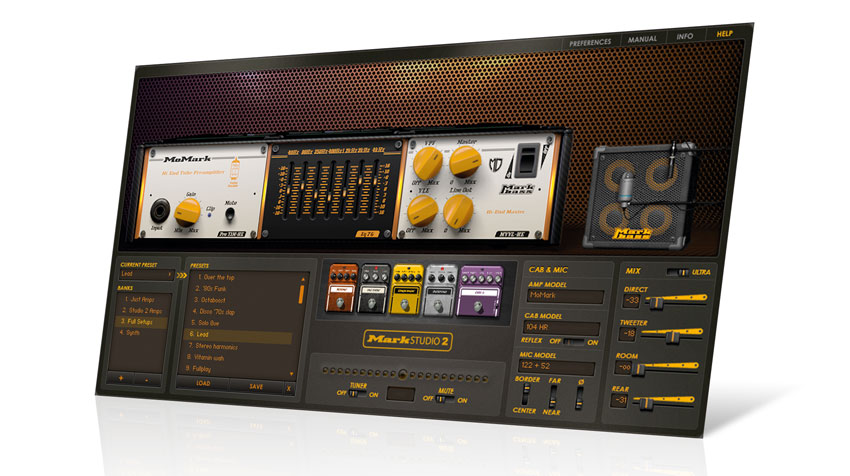MusicRadar Verdict
The current cream of the virtual bass amp crop, Mark Studio 2 is awesome.
Pros
- +
Great choice of amp flavours. Sounds excellent. Vastly improved preset system. Simple but effective mic placement. Flexible pedal board.
Cons
- -
Would benefit from global input and output levels. Balancing signals not always intuitive.
MusicRadar's got your back
Italian manufacturer Markbass produces an impressive range of bass heads, combos and cabinets, including the user-configurable modular MoMark system.
Overloud's original Mark Studio plug-in, designed in collaboration with Markbass, included three amps, six cabinets and a compressor. It sounded great, but at £190 was a little overpriced.
Now, version 2 is here (VST/AU/RTAS/AAX), and it's not only significantly cheaper but also considerably better spec'd. You get six heads (including the aforementioned MoMark), nine cabinets and seven microphone options. The compressor has been incorporated into the new Pedalboard section, which includes four further effects (Octaver, Env-Filter, Distortion and CHR-5 Chorus).
"The preset library has also been revamped and now includes just over 100 presets"
The preset library has also been revamped and now includes just over 100 presets, ranging from basic amp-only settings to full-on pedal-enhanced rigs, as well as the ability to add further presets and banks of your own. Rounding things off is a tuner with pitch scale, note readout and amplifier mute option. Finally, MIDI controllers can be assigned to the five pedals, as well as the amp master output level.
Each of the original amps being emulated has its own particular feature set, and Mark Studio 2 includes them all. The context-sensitive help system is very useful here, particularly in deciphering some of the less obvious controls and confirming the signal flow (see boxout). Options include Virtual Loudspeaker Emulation (VLE), Variable Pre-shape Filter (VPF), amplifier compression and graphic EQ, as well as more traditional EQ.
Bass in the place
In use, we found the MoMark great for a tight, punchy studio sound with a scooped middle, and the RA500 and Little Mark good for clean, punchy sounds. The Classic 300 produces a bright, retro P-Bass tone, while the TA501 gives up a powerful sound enhanced by the tube compression. The 'biggest' sounding amp here is the TTE500, which is well suited to slightly more gritty rock bass sounds.
"Mark Studio 2 certainly has the ability to make weedy bass sounds fat, rich and eminently mix-ready"
The amp output can be shaped using the cabinet and mic options. These are pretty simple, comprising cone border/centre and near/far, with phase reverse and bass reflex position where applicable. The cabinets influence the overall tone, adding depth to the direct amplifier sound, but it's a subtle rather than radical modification. For the most part, the same is true for the mics, our favourites being the rounded Condenser 47 and darker Ribbon 122. For more colour, the Dynamic 57 delivers a very pointy, 'bass light' sound.
Want all the hottest music and gear news, reviews, deals, features and more, direct to your inbox? Sign up here.
The option to blend in some of the post-pedal (pre-amp head) sound at the output is definitely welcome, as is the additional 'rear' mic. The Tweeter and Ultra options offer further high- and low-frequency enhancement respectively, and, finally, the pedal section is on hand (or, rather, foot) to throw in some more traditional effects flavours - we particularly like the chorus.
Mark Studio 2 certainly has the ability to make weedy bass sounds fat, rich and eminently mix-ready. It would benefit from global input and output levels, and at times balancing the various elements of the signal isn't entirely self-explanatory, but in terms of sound alone, this is probably our favourite bass amp plug-in to date.
Computer Music magazine is the world’s best selling publication dedicated solely to making great music with your Mac or PC computer. Each issue it brings its lucky readers the best in cutting-edge tutorials, need-to-know, expert software reviews and even all the tools you actually need to make great music today, courtesy of our legendary CM Plugin Suite.

